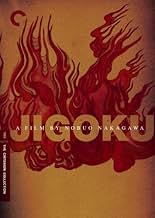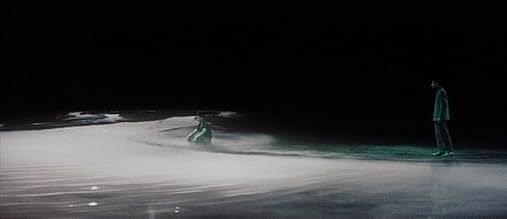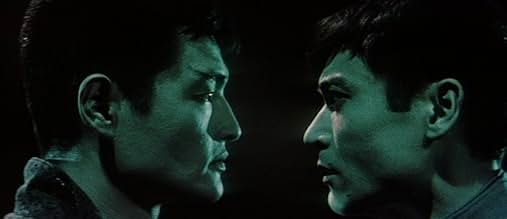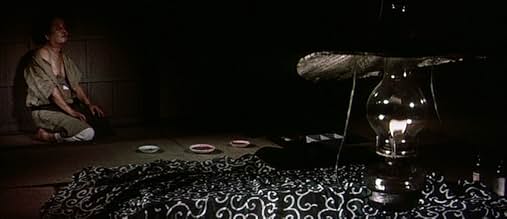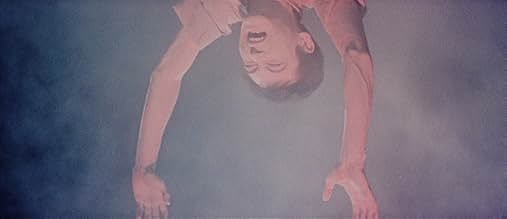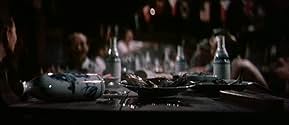Eine Gruppe von Sündern, die in miteinander verbundene Geschichten von Mord, Rache, Betrug und Ehebruch verwickelt sind, treffen sich alle an den Toren der Hölle.Eine Gruppe von Sündern, die in miteinander verbundene Geschichten von Mord, Rache, Betrug und Ehebruch verwickelt sind, treffen sich alle an den Toren der Hölle.Eine Gruppe von Sündern, die in miteinander verbundene Geschichten von Mord, Rache, Betrug und Ehebruch verwickelt sind, treffen sich alle an den Toren der Hölle.
- Regie
- Drehbuch
- Hauptbesetzung
- Professor Yajima
- (as Torahiko Nakamura)
Empfohlene Bewertungen
From the stylized approach (shooting from odd angles and the occasional adoption of a greenish hue) to its plethora of arresting imagery (especially the gruesome body piercing - sword through neck, eye-gouging, feet stamping on huge needles, torso sawed in half, etc.), director/co-writer Nakagawa's vision of Hell is surely among the most visceral ever depicted on the screen. While its concept of establishing sections (or circles) of punishment for specific crimes goes all the way back to Dante Alighieri - though, as mentioned in the film itself, Buddhism has its own take on the subject - cinematically it anticipates the one seen in the Coffin Joe outing THIS NIGHT I'LL POSSESS YOUR CORPSE (1966). Still, with respect to both the microcosmic viewpoint of the plot and the film's vivid color scheme, it also reminded me of GOKE - BODY SNATCHER FROM HELL (1968), while its essential nihilism (I literally lost count of the number of people killed off during the first hour!) looks forward to BLIND BEAST (1969).
The doppelganger element - in the DVD's main supplement, a 39-minute featurette, it's mentioned that the script was partly inspired by the Faust legend - heightens the film's already disquieting aura: Yoichi Numata as an emissary of Hell in human form (though he's not spared the painful retribution for his sins once the scene shifts to the netherworld) is especially effective; interestingly, the actor was disappointed by his own performance and admits now that he couldn't understand the role! However, I need to point out that - much like I had written of Ingmar Bergman's THE RITE (1969) - the plot reaches a level of implausible melodrama as to feel almost like a parody (even more so when considering the various characters' penchant for bursting into sentimental songs a' la the work of John Ford!).
Anyway, while I found the DVD transfer somewhat dark, I'm glad to say that the copy I own is the 'Second Pressing' - this means that the problem concerning a 2-minute sequence, which previously got skipped when watching the disc on a DVD player, has now been fixed. Originally intended for Eclipse, Criterion's sub-label - back when it was supposed to release little-known genre/exploitation titles - I feel that the film is important enough to warrant its place in the official Collection.
The bits from GHOST STORY OF YOTSUYA (1959) shown in the featurette were very intriguing and, hopefully, won't be too long in coming; still, I was equally itching to learn more about the various 'B' horror films by Nakagawa and production company Shintoho (which had actually started out by making such masterworks of World Cinema as Akira Kurosawa's STRAY DOG [1949] and Kenji Mizoguchi's THE LIFE OF OHARU [1952]!) whose posters form the extensive still gallery...
Although I have to admit that I'd never heard of the film prior to Criterion's DVD announcement, Chuck Stephens - in his rather pretentious essay in the accompanying booklet (though he perceptively suggests that the pairing of the dead yakuza's mother and girlfriend may well have anticipated the deadly female relatives of ONIBABA [1964]) - believes that JIGOKU ought to be thought of in the same terms as such horror landmarks as EYES WITHOUT A FACE (1959), BLACK Sunday (1960), PEEPING TOM (1960) and PSYCHO (1960), films which collectively brought an unprecedented maturity to the genre. Needless to say, the film's greatest influence can be seen in the gore-drenched Asian exploitation cinema which survives to this day (interestingly enough, JIGOKU was itself remade twice over the years - in 1979 and 1999!).
While the hell sequences of Jigoku seem to gather most of the attention I think that the story as a whole is what makes this movie good. It proceeds fluently from disaster to another and while some events lead to unexpected results the script never leaves a viewer with a feeling that the twist was added just for the twist's sake (as is the case with many new movies).
Technically the movie is awesome; good acting, great score (especially the haunting vocals) and beautiful cinematography. From modern perspective some of the hell sequences are way outdated (mainly the demons) while some look brilliant even today (settings like the river bank and some of the gore effects like the guy who gets flayed).
I doubt that Jigoku pleases everyone but if you're into bleak and uncompromising movies this is almost a must see. 8/10
This movie is directed by Nobuo Nakagawa (The Living Koheiji) and stars Shigeru Amachi (The Ghost of Yotsuya), Kiyoko Tsuji (House), Utako Mitsuya (Evil Brain from Outer Space) and Yôichi Numata (Ringu).
This is one of those movies with a slow burn and focuses initially on the characters, their backstories and present circumstances before things get really exciting, then the last 20 minutes are outstanding. The background music and sound effects are excellent and the director has good use of color to create intensity, especially at the end. This is one of those movies with great use of a fog machines from beginning to end. I will say the cinematography is inconsistent but the kill scenes at the end are awesome and there's a decapitation scene that makes this movie worth watching alone. The corpses are also very well done and the conclusion is worthwhile.
Overall, this movie isn't perfect but it is well made, has some tremendous kills and does have a worthwhile ending. I would score this a 7/10 and recommend seeing it once.
Wusstest du schon
- WissenswertesThe film's production company was going out of business while the film was being completed, leading to budget-saving tactics such as the actors helping dig their own holes in the movie's set for Hell. Critics kidded that this film killed the Shintoho Studio.
- PatzerWhile Shiro is on the rope bridge, we see him at various times hanging on to the side handrails. Between shots, without him having changed position, these handrails quite noticeably change in diameter from thin cables to a much thicker cable, indicating that some shots were filmed on a real bridge, others were filmed on a studio mock-up.
- Zitate
Tamura: So you want to turn me in for manslaughter?
Shiro Shimizu: We're the ones who killed him. We caused it. Let's go together. Please.
Tamura: That might ease your conscience, but I'm not interested. It'd be stupid. He was drunk. He ran into the road. It was basically suicide. Besides, he was just some yakuza scum. He's not worth the best years of our lives.
- VerbindungenFeatured in Building the Inferno: Nobuo Nakagawa and the Making of 'Jigoku' (2006)
- SoundtracksComin' through the Rye
(uncredited)
Music: traditional
Japanese lyrics: unknown
Top-Auswahl
- How long is The Sinners of Hell?Powered by Alexa
Details
- Laufzeit
- 1 Std. 41 Min.(101 min)
- Seitenverhältnis
- 2.35 : 1

